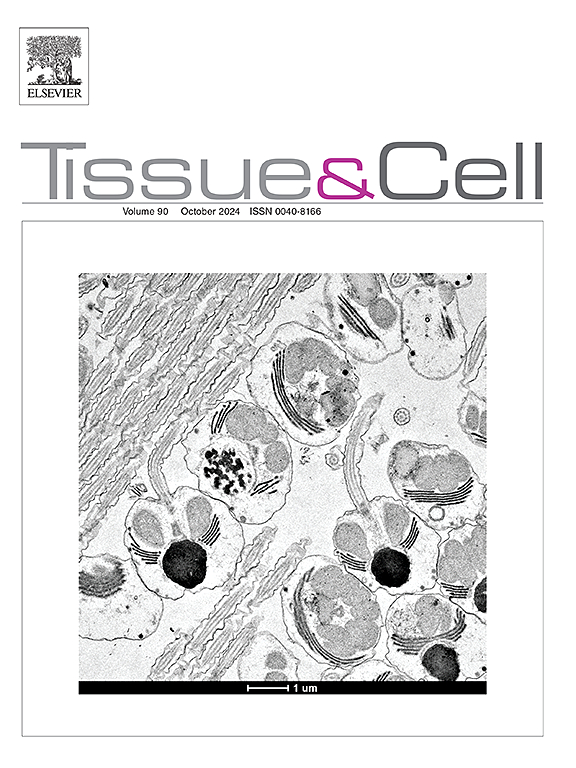Hepatoprotective effect of silymarin-chitosan nanocomposite against aluminum-induced oxidative stress, inflammation, and apoptosis
IF 2.5
4区 生物学
Q1 ANATOMY & MORPHOLOGY
引用次数: 0
Abstract
Aluminum (Al) is abundant in the environment, and its toxicity is attributed to free radical formation and subsequent oxidative stress. While silymarin is a well-known antioxidant, its low water solubility and bioavailability limit its therapeutic effects. This study was designated to formulate silymarin chitosan nanoparticles (SM-CS-NPs) and evaluate its ameliorative effect against hepatotoxicity induced by aluminum chloride (AlCl3). SM-CS-NPs were prepared by ionotropic gelation method and characterized using different techniques. Rats were distributed into six groups (n=7/group), control, silymarin (SM; 15 mg/kg B.W), silymarin-chitosan nanoparticles (SM-CS-NPs; 15 mg/kg), aluminum chloride (AlCl3, 34 mg/kg), SM or SM-CS-NPs administrated orally one hour before the treatment with AlCl3 for 30 days, respectively. Results showed that supplementation of SM-CS-NPs or SM solo improved the antioxidant state and reduced oxidative stress. On the other hand, the pretreatment with SM-CS-NPs or SM followed by AlCl3 significantly restored liver functions (AST, ALT, ALP, LDH, total protein, albumin, globulin, and bilirubin) and modulated oxidative stress biomarkers (TBARS and H2O2), with improved cellular antioxidant defense (SOD, CAT, GPx, GR, GST, and GSH) and maintained normal liver histological structure compared to rats treated with AlCl3 alone. Furthermore, they alleviated the inflammation and apoptosis by downregulating the expression level of COX-2, caspase-3, and TNFα. This ameliorative effect was stronger with silymarin nanoform than in bulk-state silymarin. According to the findings, silymarin preparation in nanoform boosts its ameliorative and protective effects against AlCl3 hepatotoxicity.
水飞蓟素-壳聚糖纳米复合材料对铝诱导的氧化应激、炎症和细胞凋亡的肝保护作用
铝(Al)在环境中含量丰富,其毒性归因于自由基的形成和随后的氧化应激。水飞蓟素是一种著名的抗氧化剂,但其水溶性和生物利用度较低,限制了其治疗效果。本研究旨在制备水飞蓟素壳聚糖纳米颗粒(SM-CS-NPs),并评估其对氯化铝(AlCl3)诱导的肝毒性的改善作用。SM-CS-NPs采用离子凝胶法制备,并使用不同的技术对其进行表征。将大鼠分为六组(n=7/组),分别为对照组、水飞蓟素(SM;15 mg/kg B.W)组、水飞蓟素-壳聚糖纳米颗粒(SM-CS-NPs;15 mg/kg)组、氯化铝(AlCl3,34 mg/kg)组、在氯化铝治疗前一小时口服SM或SM-CS-NPs组,连续30天。结果表明,补充 SM-CS-NPs 或 SM 单体可改善抗氧化状态,降低氧化应激。另一方面,与单独使用 AlCl3 的大鼠相比,使用 SM-CS-NPs 或 SM 后再使用 AlCl3 的大鼠能显著恢复肝功能(AST、ALT、ALP、LDH、总蛋白、白蛋白、球蛋白和胆红素),调节氧化应激生物标志物(TBARS 和 H2O2),提高细胞抗氧化防御能力(SOD、CAT、GPx、GR、GST 和 GSH),维持正常的肝组织学结构。此外,它们还通过下调 COX-2、caspase-3 和 TNFα 的表达水平,缓解了炎症和细胞凋亡。与散装水飞蓟素相比,纳米水飞蓟素的这种改善作用更强。研究结果表明,以纳米形式制备的水飞蓟素可增强其对氯化铝肝毒性的改善和保护作用。
本文章由计算机程序翻译,如有差异,请以英文原文为准。
求助全文
约1分钟内获得全文
求助全文
来源期刊

Tissue & cell
医学-解剖学与形态学
CiteScore
3.90
自引率
0.00%
发文量
234
期刊介绍:
Tissue and Cell is devoted to original research on the organization of cells, subcellular and extracellular components at all levels, including the grouping and interrelations of cells in tissues and organs. The journal encourages submission of ultrastructural studies that provide novel insights into structure, function and physiology of cells and tissues, in health and disease. Bioengineering and stem cells studies focused on the description of morphological and/or histological data are also welcomed.
Studies investigating the effect of compounds and/or substances on structure of cells and tissues are generally outside the scope of this journal. For consideration, studies should contain a clear rationale on the use of (a) given substance(s), have a compelling morphological and structural focus and present novel incremental findings from previous literature.
 求助内容:
求助内容: 应助结果提醒方式:
应助结果提醒方式:


